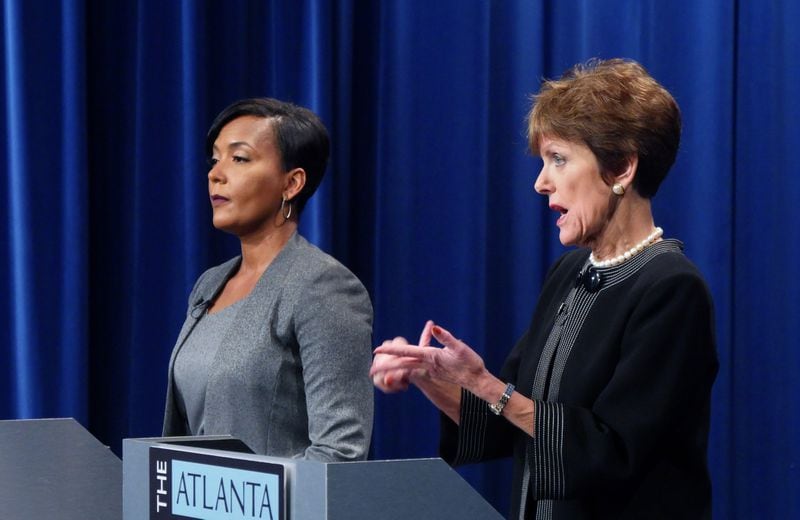Over the last few months, Atlanta’s mayoral candidates have appeared at numerous forums and debates. The dozen or so contenders heard their opponents stump speeches and narratives so often that they could recite one another’s buzzwords and slogans – at times in a mocking cadence.
But now only two remain: City Councilwomen Keisha Lance Bottoms and Mary Norwood.
And with a runoff election less than two-and-half weeks away, The Atlanta Journal-Constitution sought to dispense with platitudes and find out where each stands on a variety of issues by using a question and answer format.
Here is what they had to say:
Atlanta has earned a national reputation as the “city too busy to hate.” What will you do to ensure your campaign does not send messages that damage this “post-racial” reputation?
KLB: I have not run on race at all. I have run on who I am as a person, who I am as a professional and who I have been as an elected official and what my vision is for the city as a whole. And that transcends race. Whether I am in southwest Atlanta, or whether I'm on the north side of Atlanta, or talking to an audience of primarily African Americans or primarily white residents, our issues and concerns are the same. We all want safe communities. We want good schools in our communities. We want a clean city. We want transit in our city. And we want a city that's affordable for all. People don't want a monolithic Atlanta. People move to Atlanta each and every day because they like the socioeconomic diversity.
MN: No. 1, the Norwood campaign is an inclusive campaign, in the staff and the volunteers. We have support from all over the city. … Atlanta was a beacon for civil rights in the 20th century. We have to be a beacon in the 21st century for inclusivity, for celebration of diversity and for embracing everyone – regardless of nationality, ethic background or orientation. That is my whole life, and it is the Atlanta we aspire to. This campaign over the next three weeks needs to be about which candidate do you feel will do the best job of running this city. It should be about who we are; not about what we look like.
What legislation have you sponsored to attract investment south of Interstate 20?
KLB: Something that actually just came out of committee …that I'm very happy about is legislation that waives the occupational tax for businesses that are willing to relocate into under-served areas. … It will impact the entire city of Atlanta. It's again a way to get businesses to look at other areas that they might not have historically looked at.
MN: I serves as co-chair of the code enforcement commission for three years. We investigated and researched why we could not get the abandoned houses and the abandoned apartment buildings out of the communities. …We got the state law changed, so that now we can take abandoned properties, we can transfer them to the land bank, and we can re-purpose them for affordable housing … and we can knit communities back together.
Credit: Hyosub Shin
Credit: Hyosub Shin
The city was criticized by activists and residents for the handling of the Peachtree-Pine homeless shelter. Do you think the city has the correct strategy to curb homelessness?
KLB: Yes, I do think we have the correct strategy. The way that we were … warehousing our homeless population is really an antiquated approach. … When you provide shelter first, but also make sure that you are housing people with dignity and providing the supportive services that are needed … I think you will continue to see our homeless population decrease. But more than that, we are addressing the root issues that are leading people to be homeless.
MN: The Peachtree-Pine Center was not an ideal environment to enable men, women or children to re-establish their lives in any kind of meaningful manner. What the [City] Council was told was that, and what I understood by talking to Crossroads [Community Ministries], they had placed the vast majority of the individuals who had been at Peachtree-Pine. And it was something like 94 percent. The mayor of Albuquerque created a program where, if you would like work, you could come and work with his public works department. And I would institute something similar in Atlanta. I would like to see everyone who wants to be employed, or who has been regulated to panhandling being their only option, that there is a better option for them.
Many communities in Atlanta lack access to quality education and economic opportunity. How will you change that?
KLB: The meeting that I just left was with the superintendent and one of the (school) board members. I wanted to make sure that, as we entered a new administration, we are all working on the same page as it relates to improving education throughout our city. I talked about appointing a director of education … not to just address education as it relates to our children, but to help deal with our families comprehensively … and also to address the issue of making sure that we have a very effective early childhood education approach, a comprehensive approach.
MN: We have not done the kind of job we should with connecting our young people with jobs, with internships, with access to corporations. In my campaign, I have met with many associations, and every single one wants young people involved. They are looking for those next entry-level workers, so one of the things the city can do is when people have contracts with the city … have several young people involved as interns and in some way participating when big contracts are being let for work involved through city government.
An assistant U.S. attorney has said that corruption is prolific at City Hall. Is that accurate?
KLB: I don't know if it's accurate or not because I'm not privy to all of the information that the U.S. attorney has. But what I do know is that we have about 8,000 city employees who, by and large, operate with integrity and go to work each and every day and make an honest living. That being said, when you have someone as high level as our procurement director who has pleaded guilty to accepting bribes, then clearly there's a problem in City Hall.
MN: (What) I have observed over the past eight years … is that it's pretty apparent. When you have your chief procurement officer who has admitted and pleaded guilty [to bribery], that's prolific. That was the individual in charge of procurement. That's the administration.
Do you believe the procurement process lacks transparency? If so, how would you make the process more open?
KLB: I think that there is a lot of room for improvement with our procurement process. … We still use a paper-based process. I think there are many cities across the country who use an electronic process. It makes it less expensive on businesses. I have spoken with people who have said it's cost their company $100,000 just to place a bid in the City of Atlanta. I think, by moving to electronic process, the public will have access to that information much faster and literally at their fingertips. I also think we need a complete audit of procurement process.
MN: That answer is yes with an exclamation point. I will bring in a procurement director who has been head of procurement at a publicly traded company. We cannot fix this around the edges. … Atlanta needs a clean break and a new administration – a mayor that will come in and have 100 percent accountability and 100 percent transparency. From Day One, it will be a new day.
Have you or anyone representing you been interviewed by federal authorities related to the corruption scandal?
KLB: Absolutely not.
MN: No
What is your timeline for finishing the Beltline?
KLB: The Beltine is an ongoing project. A lot of it has to do with us making sure we have all the land acquired that we need, that we have the community input and buy-in that we need. The timeline, I think, is not committing to a specific date. But a specific goal is to complete it as soon as possible.
MN: As quickly as we can construct it.
Neither of you have experience managing an organization with 8,500 employees. How will you compensate for your lack of experience?
KLB: The most successful CEOs recognize that they don't know everything, and they make sure that they are working with people who know certain areas better than others. That will be no different than I will approach being mayor of this city. It's about continuing to partner with people who do things well, whether it be internal personnel, as it relates to our department heads, whether it be with our community leaders, our non-profit leaders or our corporate leaders … In those areas where I need assistance, I will not hesitate to pick up the phone.
MN: I intend to have executive searches, for cabinet positions and commission officials. And the scale is different but the principles are exactly right. I will get the best and the brightest and let them run their departments without interference. I will do that. One hundred percent.
MYAJC.COM: REAL JOURNALISM. REAL LOCAL IMPACT.
The AJC's Stephen Deere keeps you updated on the latest in the Atlanta mayoral race and everything else going on at City Hall. You'll find more on myAJC.com, including these stories:
Never miss a minute of what's happening in Atlanta politics. Subscribe to myAJC.com.








